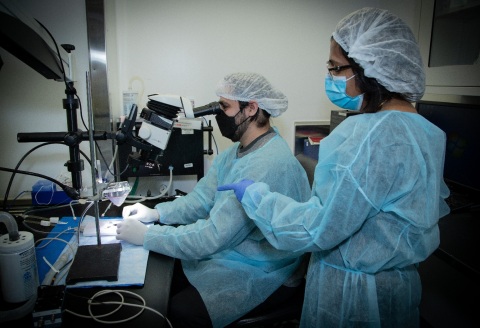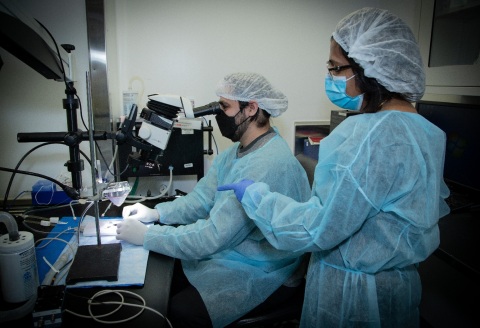MANHASSET, N.Y.--(BUSINESS WIRE)--New research shows that liver-focused ultrasound stimulation significantly decreases chronic inflammation linked to obesity. In a study published today in Scientific Reports, researchers from the Feinstein Institutes for Medical Research and GE Research demonstrate that ultrasound technology could be used as a noninvasive approach to treating obesity. These findings are important as they present breakthrough noninvasive methods to tap into the nervous system to treat metabolic diseases without the use of pharmaceuticals.
More than 650 million adults worldwide are obese, which often leaves them vulnerable to a number of medical comorbidities and despite an urgent need for treatments, no specific long-lasting therapeutic approaches are currently available. In obesity, pro-inflammatory markers, like cytokine proteins, have been associated with hyperglycemia, insulin resistance and hypertension. Additionally, obesity leads to reduced vagus nerve activity and metabolic dysfunction.
The latest study on obesity is based on GE’s novel discovery that ultrasound can be used to perform peripheral nerve modulation as a new form of bioelectronic medicine. Over the past four years, GE has worked with the Feinstein Institutes and other collaborators to advance this new technology toward future clinical applications to treat diabetes, chronic inflammatory conditions like arthritis, and more recently, obesity.
“Obesity is linked to devastating health problems, like heart disease, diabetes, and high blood pressure, and yet there are no long-lasting clinical treatments,” said Sangeeta S. Chavan, PhD, professor in the Institute of Bioelectronic Medicine at the Feinstein Institutes, and principal investigator on the paper. “These encouraging results show the unrecognized potential ultrasound has to alleviate this deadly condition.”
In preclinical studies, Dr. Chavan and Tomas Huerta, a graduate student, demonstrated the therapeutic effects of targeted ultrasound stimulation on body weight, food intake, and metabolic and inflammatory markers. Overall, the severity of obesity was reduced. These initial results suggest peripheral focused ultrasound can modulate obesity-associated complications without side effects and show promise for the development of noninvasive therapy for chronic diseases like diabetes and metabolic syndrome.
“The latest breakthrough highlighted in Scientific Reports builds on previous work by GE, demonstrating that peripheral ultrasound induced nerve modulation is capable of regulating critical neurons involved in glucose regulation, food intake and metabolism,” said Victoria Cotero, a senior scientist in the Biosciences Group at GE Research and technical lead and co-principal investigator. “From diabetes to now obesity, we are showing the future potential of this platform as an alternative to drug treatments to treat these chronic conditions.”
Cotero cited several breakthroughs that GE’s bioelectronic medicine team has achieved since starting a research program in 2016. The team also has published numerous papers in Nature Communications, the Journal of Neuroscience Method and Experimental Physiology, demonstrating other potential treatments for hyperinflammatory conditions such as type 2 diabetes, metabolic syndrome and irritable bowel disease.
The Feinstein Institutes, the global scientific home of the emerging field of bioelectronic medicine, explores the use of electronic devices to treat diseases and injury instead of drugs while reducing significant side effects associated with drugs. The goal of bioelectronic medicine is to identify neural targets that can be selectively activated or inhibited, which can control when needed, the function of specific organs. Results from this ultrasound study indicate the possibility of one such novel, noninvasive bioelectronic medicine treatment for obesity.
“Researchers and clinicians consider bioelectronic medicine as an alternative to some of the most critical conditions, like obesity,” said Kevin J. Tracey, MD, president and CEO of the Feinstein Institutes and co-author on the paper. “This important collaboration with GE Research points to future studies that may improve the lives of patients with obesity."
Recently, there have been significant breakthroughs in bioelectronic medicine. In November 2020, Dr. Chavan and her team discovered that a small cluster of neurons within the brain is responsible for controlling the body’s immune response and the release of cytokines, which leads to inflammation in the body. This discovery, published in Proceedings of the National Academy of Sciences of the United States of America (PNAS), adds to the growing body of research in the field of bioelectronic medicine and how the brain regulates the body’s immune response.
About the Feinstein Institutes
The Feinstein Institutes for Medical Research is the research arm of Northwell Health, the largest health care provider and private employer in New York State. Home to 50 research labs, 3,000 clinical research studies and 5,000 researchers and staff, the Feinstein Institutes raises the standard of medical innovation through its five institutes of behavioral science, bioelectronic medicine, cancer, health innovations and outcomes, and molecular medicine. We make breakthroughs in genetics, oncology, brain research, mental health, autoimmunity, and are the global scientific leader in bioelectronic medicine – a new field of science that has the potential to revolutionize medicine. For more information about how we produce knowledge to cure disease, visit http://feinstein.northwell.edu and follow us on LinkedIn.
About the GE Research
GE Research is GE’s innovation powerhouse where research meets reality. We are a world-class team of scientific, engineering and marketing minds working at the intersection of physics and markets, physical and digital technologies, and across a broad set of industries to deliver world-changing innovations and capabilities for our customers. To learn more, visit our website at https://www.ge.com/research/.





